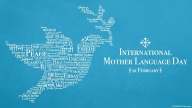Message from Ms Irina Bokova, Director-General of UNESCO, on the occasion of International Mother Language Day, 21 February 2013
Press Release 13-006-E 2013.02.21
International Mother Language Day is an ideal opportunity to highlight the importance of languages to group and individual identity, as the foundation for all social, economic and cultural life.
Multilingualism is a source of strength and opportunity for humanity. It embodies our cultural diversity and encourages the exchange of views, the renewal of ideas and the broadening of our capacity to imagine. Genuine dialogue implies respect for languages, and this is why UNESCO works to harness their power to foster mutual understanding. We encourage teaching in the mother tongue, which facilitates the fight against illiteracy and contributes to the quality of education. The protection of languages ensures also that rare and indigenous knowledge is safeguarded and handed down. By giving each of us the means to make ourselves heard and be respected, this is also a force for social inclusion.
This year, UNESCO has decided to explore the links between languages and books. Books are a force for peace and development that must be placed in the hands of all. They are also crucial tools for expression that help to enrich languages, while recording their changes over time. In this age of new technologies, books remain precious instruments, easy to handle, sturdy and practical for sharing knowledge, mutual understanding and opening the world to all. Books are the pillars of knowledge societies and essential for promoting freedom of expression and education for all.
The vitality of languages depends as much on oral exchange as on the large-scale production of teaching material and printed texts. In some countries, the dearth of books and textbooks in local languages hampers development and social inclusion and represents a violation of the right to freedom of expression. Digital tools can help to fill this gap, but they are not enough. We must do more to distribute materials and books as widely and fairly as possible, so that all people – children above all – can read in the language of their choice, including in their mother tongue. This can also boost progress towards the Education for All goals by 2015. Translation is an important part of this great project, by creating bridges to new readers.
On this 14th International Mother Language Day, I call on all UNESCO’s partners, authors and teachers all over the world, in universities, the UNESCO Chairs and Associated Schools to work together to promote the importance of linguistic and cultural diversity and of education in the mother tongue.
* *** *



